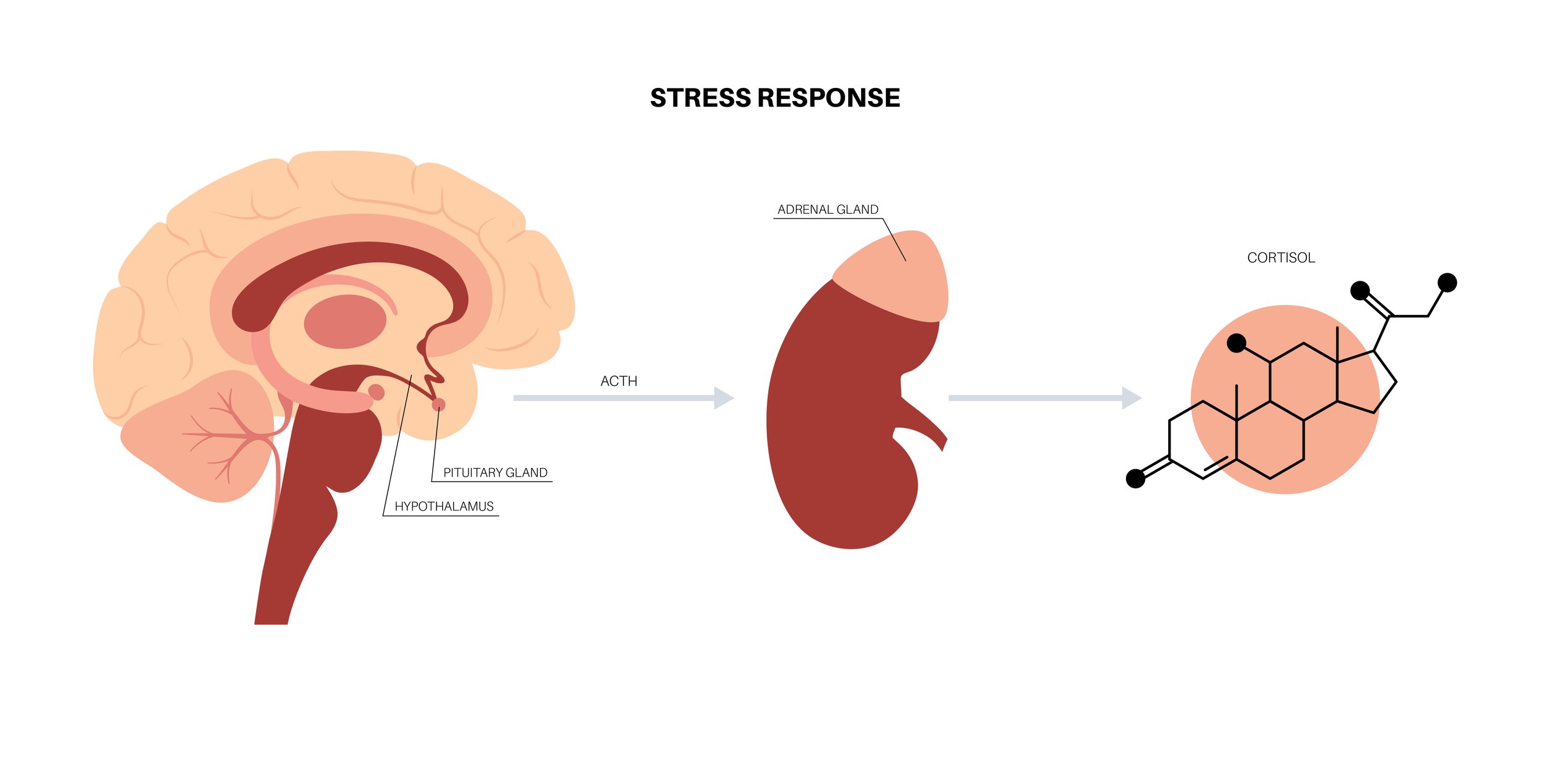
Adrenal Health and Cortisol Testing
Information
Stop Guessing
🔑
Start Knowing
🔑
Stop Guessing 🔑 Start Knowing 🔑
Adrenal Glands and Hormone Balance
The adrenal glands, otherwise known as the “stress glands” enable your body to cope with stress and survive. Shaped like two tiny pyramids, they sit atop the kidneys and from this central location mobilize your response to every possible change within your environment.
Whether coming from outside of ourselves in the form of a natural disaster, or from within, like the anxiety we experience before public speaking, it is the adrenals’ job to help us adapt to the situation. They accomplish this by secreting key hormones like adrenaline (epinephrine) to mobilize the body’s natural “fight or flight” response in an emergency, and cortisol, the primary stress hormone that fine-tunes our response to the stress and strains of everyday living.
Adrenals in balance
Produce adequate amounts of DHEA and cortisol to power us through the day, taking stress in stride. Together these hormones impact just about every process in the body, from energy production and immune activity to cellular maintenance and repair. They are key regulators of glucose, insulin and inflammation, and play a major role in bone and muscle building, mood and mental focus, stamina, sex drive and sleep cycles.
Adrenals out of balance
From consistently producing too much cortisol, to overworked and unable to produce enough essential hormone to keep us running on all cylinders, there are 5 stages of adrenal imbalance, in-between the two extremes of Cushing’s (an over production of cortisol often accompanied by adrenal tumors) and Addison’s (Adrenal Insufficiency, the adrenals can no longer make cortisol.) When a person is under constant physical or emotional stress, the adrenal glands are taxed to release elevated amounts of cortisol, the master stress hormone. When this happens other functions of the body can be affected negatively and may also become imbalanced. But over time, if stress levels remain high, adrenal output is diminished. When that happens, cortisol levels plummet, along with our energy. We start to run out of steam, sleep fitfully, get sick and pack on pounds through the middle. These are the hallmark signs of adrenal fatigue or HPA-Axis dysfunction.
HPA-Axis (hypothalamic-pituitary-adrenocortical axis)
Stress and HPA-Axis Dysfunction (Adrenal Fatigue)
More commonly known as Adrenal Fatigue, HPA-Axis Dysfunction happens when we live in a state of chronic unresolved stress. We all experience stress at some point in our life. It motivates us to not run in front of moving vehicles, meet our deadlines on-time, and push ourselves to be the best we can be. However, persistent stress can be detrimental to our physical, mental, and emotional well-being.
Chronic over activation of the hypothalamic-pituitary-adrenal (HPA) axis brought on by long-term stress can cause mood disorders such anxiety, depression, mood swings, and irritability. Numerous additional health concerns, including diabetes, heart disease, irritable bowel syndrome, infertility, and auto-immune diseases including rheumatoid arthritis, lupus, chronic fatigue syndrome, and fibromyalgia, are influenced by long-term exposure to high stress hormones.
Long Term Stress Effects
When stress is prolonged, adrenal hormones start fluctuating up and down, triggering blood sugar and insulin imbalances, food cravings, weight gain and sleep disturbances. Adrenals under pressure create imbalances of other hormones, e.g., stealing progesterone away from its reproductive duties to make extra cortisol, or inhibiting thyroid function and metabolism.
If stress levels stay high, the adrenals remain in “survival mode” to keep us going: by increasing alertness (i.e., sleeplessness), appetite (i.e., overeating) and fat reserves (i.e., stored as belly fat), while health and immunity against illness and disease steadily weaken.
IF YOU ANSWER YES TO TWO OR MORE OF THESE QUESTIONS, YOUR ADRENAL FUNCTION MAY BE IMBALANCED...

SYMPTOMS OF ADRENAL IMBALANCE
Mild to severe hypoglycemic episodes
Palpitations; pounding heart, heavy and hard heartbeat
Tachycardia; higher heart rate
Anxiety; feeling of panic
“Air hunger”; feeling starved for air, short of breath
Flu-like symptoms
Headache
All over body ache
Super-sensitive skin
Scalp ache
Hairloss
Feeling Hyper
Jittery
Clumsy (drop things, bump into things)- confusion
Suddenly feel extremely hungry
Low back pain
Weakness
Stress intolerance
Social anxiety
Difficulty focusing on more than one thing at a time
Shaky hands; shakiness
Diarrhea
Rage or sudden angry outbursts
Emotionally hyper-sensitive
Extreme fatigue
Brain Fog
Highly defensive
Paranoia; about people, places or things
Exacerbated reactions to daily stress
No patience
Easily irritated
Nausea in the face of stress
Even minor stress can have effects for days
Prolonged recovery from a dental visit
Dull cloud-filled head
Jumpiness
Muscle weakness
Dizziness
Light headedness
Motion sickness
Coffee putting patient to sleep
Vomiting even running up the slightest incline
Almost passing out every time patient gets up
Dark circles under my eyes
Waking up in the middle of the night for several hours
Difficulty falling asleep
Frequent urination
IBS symptoms
Worsening allergies
Over-reactivity
SALIVA
CORTISOL
TESTING
Adrenal glands that are out of balance can lead to:
High Cortisol
Results in insomnia, anxiety, sugar cravings, feeling tired but wired, increased belly fat & bone loss
Low Cortisol
Causes chronic fatigue, low energy, food and sugar cravings, poor exercise tolerance or recovery & low immune reserves
DHEA
Out of balance adrenals can lead to high or low DHEA.
The importance of Saliva Cortisol Testing
Saliva cortisol reveals your cortisol levels at four key times in a day, plus what is unbound and available for use. Much better than blood testing, which measures mostly bound and unusable cortisol (up to 95% can be unuseable!)
Why should I use ZRT Labs to test my Cortisol?
ZRT provides superior saliva cortisol testing, since 1998. In addition, ZRT tests give you the important ranges for each suggested time you collected saliva, unlike so many others that have since come on the market.




